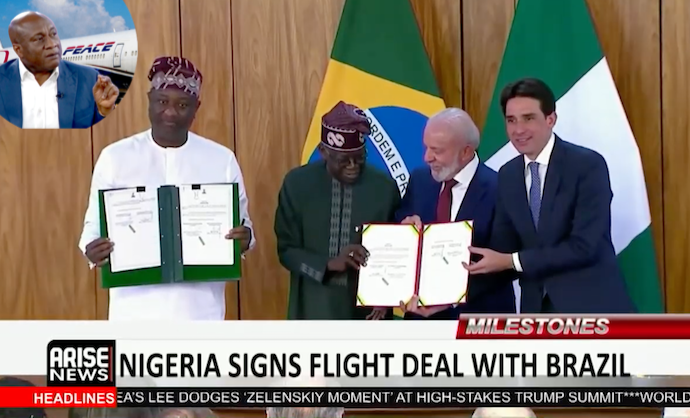
CHUKWUEMEKA UWANAKA argues that direct flights between Nigeria and Brazil can also serve as a catalyst for IVM to be part of the Embraer manufacturing supply chain
“We are increasing our partnership with Embraer. By September 17, we are going to inaugurate the commencement of construction of our new MRO (in Nigeria), and Embraer will operate maintenance for Embraer jets…You will now be able to do it here, and people will also come to Nigeria to do the same”. (Allen Onyema, CEO Air Peace. August, 2025).
The August 25, 2025 memorandum of understanding signing that formalizes the latest Bilateral Air Service Agreement (BASA) between Nigeria and Brazil, and the recent direct air connectivity test flight by Nigeria’s Air Peace between both countries before the commencement of regular flights in November 2025, are pointers to indicate some of the propositions in a recent article (Banking Sector, Keyamo & Nigeria’s $1trillion Economy) on how Nigeria’s aviation sector can support the government’s economic goal to grow the country’s gross domestic product (GDP) to $1 trillion. With news that Embraer, the Brazilian aircraft manufacturer plans to establish and operationalise a maintenance, repair and overhaul (MRO) facility in Nigeria by 2026, and the purchase confirmation of 21 new Embraer aircraft by Air Peace- five of which have been delivered, this bilateral partnership provides opportunities for integrating Nigerian companies such as Innoson Vehicle Manufacturing (IVM) that have proven engineering experience in the manufacturing of aviation spare parts into the Embraer manufacturing supply chain. This is achievable through a synergy of aviation policy with trade and industrial policy, to support the feasible attainment of Nigeria’s $1 trillion GDP economic goal by 2030, from the current GDP of $243 billion.
And why highlight the necessity of manufacturing companies such as IVM for bilateral trade and a $1 trillion economy by 2030?
It is because of the nature of international trade and its effects on domestic economics. Festus Keyamo, Nigeria’s innovative Aviation Minister highlighted the decline in bilateral trade between Nigeria and Brazil in the last decade from $10 billion to about $2 billion. But the trade pattern also says a bit more about the economic context. While Nigeria’s exports to Brazil in 2023 totaled $697 million, crude petroleum was $266 million, Nitrogenous fertilizer (from petroleum gas) was $413 million, with unprocessed fibers, plants, scrap metal, glass and sheep hides constituting about $18 million. Brazil’s total export to Nigeria same year was $1.04 billion, with a relatively diversified portfolio of sugar, wheat, machines, vaccines, pumps, foods, oxygen compounds, electric motors, tools, equipment, helicopters, among others as part of its export portfolio. From this data, 97 percent of Nigeria’s export to Brazil was derived from petroleum, while Brazil’s export to Nigeria is a diversified mix of processed and manufactured goods and services.
When the Air Peace order for 21 Embraer E2’s that could cost over $1.1 billion in imports from Brazil, plus the amount spent on purchasing spares from Brazil is added to the bilateral trade figures, this would further increase Nigeria’s trade deficit with Brazil, and also makes it less feasible for the sector to contribute substantially to the $1 trillion economy goal. This therefore highlights the necessity of having Nigerian firms with viable and feasible prospects such as IVM, as part of Embraer’s value chain. But with companies such as IVM manufacturing some components for Embraer, a more balanced trade relations is possible, especially with high-level engineering products and services where value is higher. Contemporary global supply chains are international. An assessment of global aerospace, automotive, consumer electronics and other major manufacturing-driven supply chains shows integrated mobility of stages and processes across countries and jurisdictions, such as with the United States (U.S.), China, Mexico, Europe, Vietnam, Brazil, Canada, among others. Therefore, direct flights between Nigeria and Brazil by Air Peace, Caverton Airlines and Brazil’s Varig Air can also serve as a catalyst for IVM to be part of the Embraer manufacturing supply chain, as well as other Nigerian businesses being parts of Brazil’s manufacturing supply chain and vice-versa.
An assessment of Embraer, the world’s third largest manufacturer of civil aircraft after Airbus and Boeing, shows that Nigeria can do similar manufacturing- with some hard work. It was established through conscious policies of Brazilian leaders and policymakers such as Getúlio Dornelles Vargas, Castelo Branco, Costa e Silva, Emílio Garrastazu Médici, and Ozires Silva, who saw the economic opportunities in developing a domestic aviation economy that involved research and development (R&D), engineering, manufacturing and other value chain activities. Embraer has four sections, firstly Commercial Aviation, for the development, production, sale, and lease of commercial jets, and provision of aviation support services. Defense & Security is second, consisting of R&D, production, modification, and support for military defense airplanes, alongside associated products and services. The Executive Aviation section develops, produces, and sells executive jets, and support services; while the fourth section produces structural parts, mechanical and hydraulic systems, agricultural crop-spraying aircraft, and customer training.
Embraer’s history that shows a synergy between military and civil aviation manufacturing, is similar to that of the Boeing Company, whose evolution traces back to policy direction similar to that of the United States government post-world war policies that enabled Boeing Company to develop both its civil aviation Boeing aircraft, as well as its defense arm known as Boeing Defense, Space & Security (BDS).
IVM Nigeria has had a somewhat similar experience, given its experience since 2016 in manufacturing aviation spare parts for European-made fighter jets of Nigerian Air Force (NAF), as well as maintenance of NAF Air Assets and other associated Aerospace Ground Equipment (AGE). The company has also designed and produced armoured fighting vehicles and other military hardware for the Nigerian Army, which led to a conferment of a honourary doctorate degree by the Nigerian Defence Academy on Innocent Chukwuma, the founder of IVM in 2016. It is therefore feasible to project a similar pathway for IVM, given some similarity of its history with Embraer and Boeing with military and defence manufacturing.
As strategic policy was critical to the engineering and manufacturing success of Embraer and Boeing, what is therefore required is a Nigerian strategic policy that harnesses aviation policy with components of trade and industrial policy, for domestic manufacturing dual-purpose aviation technologies and international value-chain engagements. Minister Keyamo seems well versed in policy making for such integrated policies, given his successes with Nigeria signing the Cape Town Convention (CTC) practice direction on September 12, 2024 for increased favourable access to airplanes by Nigerian operators, his aeropolitics efforts in increasing the access that Nigeria airlines have to prime aviation destinations such as Heathrow Airport, and policy encouragement that has enabled Nigerian airlines provide technical services to foreign countries. A ‘Keyamo Policy Framework’ that involves aviation manufacturing partnership for job creation, economic diversification and some level of technology transfer/sharing will indeed be a novel contribution to aviation and economic policy.
Brazil, South America’s largest economy with GDP of $2.179 trillion has been using policy as catalyst since the 1960’s for its aviation, aerospace and dual-purpose technology sectors, whose direct and additional multiplier effects contributed $46.4 billion to its economy in 2023, according to IATA. The country’s manufacturing and engineering-driven sector also serves as a key driver for other sectors, such as mechanized agriculture, where Embraer manufactures agricultural crop-spraying aircraft. Therefore, any feasible $1 trillion economy for Nigeria requires more engineering and manufacturing components, given their higher valuation. Of Nigeria’s total export of N77.44 trillion in 2024, crude oil accounted for N55.29 trillion or 71.39 percent; and other oil products were N13.06 trillion or 16.87 percent. Therefore, crude oil and other oil amounted to 88 percent of exports, while manufacturing was a meagre N2.29 trillion or 2.95 percent, while agriculture was N4.44 trillion of 5.73 percent of exports. If Nigeria is going to attain a $1 trillion economy by 2030, this structure has to change, with increased manufacturing of engineering and tech-based products. There is no top 15 economy or hardly any economy of $1 trillion and above in the world that exports mostly commodities.
The feasibility of this integrated aviation, trade and industrial policy approach significantly contributing to Nigeria’s $1 trillion economy goal by 2030, is also premised on the size of the global aviation and aerospace industry. While the global aerospace parts manufacturing market was valued at $966.13 billion in 2024 and is expected to grow from $1.013 trillion in 2025 to reach $1.485 trillion by 2033; the global aircraft MRO market size was estimated at $90.85 billion in 2024, with growth projections for $120.96 billion by 2030. These are therefore sectors with feasible growth opportunities, which Nigeria can be a part of with appropriate policy.
And there is an ideological ‘diplomatic opportunity’ for such aviation and aerospace manufacturing supply chain bilateral partnership to be established. President Lula da Silva of Brazil, who has a trade union background, is an avid supporter of economic integration among countries of the Global South. As one of the leaders of BRICS- where Nigeria is an associate member, his economic policies from his first tenure as Brazil’s president in 2003, demonstrates someone willing to work with Nigeria. Also, technology-based partnerships are feasible when the intending partner has demonstrated competence in previous manufacturing, which IVM has done in aviation related manufacturing for about a decade.
Aviation serves as a catalyst for economic development, as the saying goes. With the Nigeria-Brazil bilateral aviation pact, there is an opportunity for Nigerian companies such as Innoson Vehicle Motors which is experienced in manufacturing aviation spares and aerospace equipment to be a part of Brazil’s Embraer supply chain. That supports the $1 trillion economy by 2030 agenda of government, even as the current Brazilian government that supports Global South cooperation provides a diplomatic opportunity for this economic diplomacy goal. If Minister Keyamo is able to successfully integrate aviation policy with trade and industrial policy- a novel ‘Keyamo Policy Framework’, it will mark a major milestone in high-end manufacturing, engineering and economics in Africa, while increasing the share of manufacturing exports from Nigeria, enhancing the country’s economic complexity and stability, creating high quality science, technology and innovation jobs, and contributing to African Union Agenda 2063- all through policy. For Keyamo and Nigeria, history beckons.
Dr. Uwanaka writes from African University of Science and Technology, Abuja. chukweks@yahoo.com





